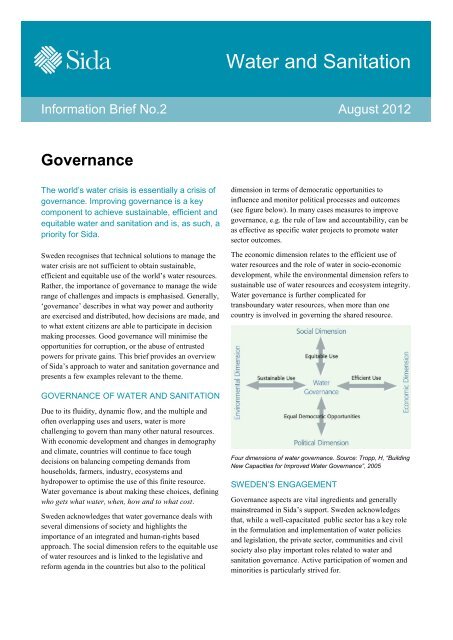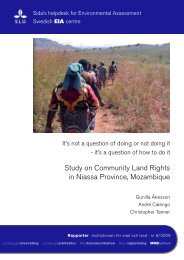Sandre consectetue volenissed tem dolore corpero faccum nos alit ...
Sandre consectetue volenissed tem dolore corpero faccum nos alit ...
Sandre consectetue volenissed tem dolore corpero faccum nos alit ...
You also want an ePaper? Increase the reach of your titles
YUMPU automatically turns print PDFs into web optimized ePapers that Google loves.
Water and Sanitation<br />
Information Brief No.2 August 2012<br />
Governance<br />
The world’s water crisis is essentially a crisis of<br />
governance. Improving governance is a key<br />
component to achieve sustainable, efficient and<br />
equitable water and sanitation and is, as such, a<br />
priority for Sida.<br />
Sweden recognises that technical solutions to manage the<br />
water crisis are not sufficient to obtain sustainable,<br />
efficient and equitable use of the world’s water resources.<br />
Rather, the importance of governance to manage the wide<br />
range of challenges and impacts is emphasised. Generally,<br />
‘governance’ describes in what way power and authority<br />
are exercised and distributed, how decisions are made, and<br />
to what extent citizens are able to participate in decision<br />
making processes. Good governance will minimise the<br />
opportunities for corruption, or the abuse of entrusted<br />
powers for private gains. This brief provides an overview<br />
of Sida’s approach to water and sanitation governance and<br />
presents a few examples relevant to the theme.<br />
dimension in terms of democratic opportunities to<br />
influence and monitor political processes and outcomes<br />
(see figure below). In many cases measures to improve<br />
governance, e.g. the rule of law and accountability, can be<br />
as effective as specific water projects to promote water<br />
sector outcomes.<br />
The economic dimension relates to the efficient use of<br />
water resources and the role of water in socio-economic<br />
development, while the environmental dimension refers to<br />
sustainable use of water resources and ecosys<strong>tem</strong> integrity.<br />
Water governance is further complicated for<br />
transboundary water resources, when more than one<br />
country is involved in governing the shared resource.<br />
GOVERNANCE OF WATER AND SANITATION<br />
Due to its fluidity, dynamic flow, and the multiple and<br />
often overlapping uses and users, water is more<br />
challenging to govern than many other natural resources.<br />
With economic development and changes in demography<br />
and climate, countries will continue to face tough<br />
decisions on balancing competing demands from<br />
households, farmers, industry, ecosys<strong>tem</strong>s and<br />
hydropower to optimise the use of this finite resource.<br />
Water governance is about making these choices, defining<br />
who gets what water, when, how and to what cost.<br />
Sweden acknowledges that water governance deals with<br />
several dimensions of society and highlights the<br />
importance of an integrated and human-rights based<br />
approach. The social dimension refers to the equitable use<br />
of water resources and is linked to the legislative and<br />
reform agenda in the countries but also to the political<br />
Four dimensions of water governance. Source: Tropp, H, “Building<br />
New Capacities for Improved Water Governance”, 2005<br />
SWEDEN’S ENGAGEMENT<br />
Governance aspects are vital ingredients and generally<br />
mainstreamed in Sida’s support. Sweden acknowledges<br />
that, while a well-capacitated public sector has a key role<br />
in the formulation and implementation of water policies<br />
and legislation, the private sector, communities and civil<br />
society also play important roles related to water and<br />
sanitation governance. Active participation of women and<br />
minorities is particularly strived for.
Examples of Swedish support related to water sanitation governance<br />
DEMYSTIFYING GOVERNANCE<br />
The Water Governance Facility (WGF) at SIWI forms an<br />
integral part of the UNDP Water Governance Programme.<br />
Funded by UNDP and Sida, the WGF provides assistance<br />
and technical support to developing and transitional<br />
countries to promote progress on water and sanitation<br />
governance. WGF aims to make the concept of<br />
governance easy to understand and apply, and provides<br />
practical and demand-based assistance. For instance, the<br />
WGF supports reform efforts in Kenya to improve water<br />
accountability using human rights based approaches<br />
including: feedback and complaints mechanisms between<br />
rights-holders and duty bearers; development of anticorruption<br />
tools; and strengthening capacity of water<br />
actors to understand and participate effectively and<br />
meaningfully in the water sector reform.<br />
reform new institutions have been established with clearly<br />
defined mandates and separation of functions to ensure<br />
effective policy making, independent regulation, effective<br />
planning, asset development, and enhanced accountability.<br />
Emerging water resource user associations assist the<br />
decentralised water authorities to address some of the<br />
chronic problems that have constrained water resource<br />
management in the past, including low levels of<br />
compliance with regulations, inadequate monitoring, and<br />
poor land and water use practices.<br />
SUPPORT TO NON-STATE ACTORS<br />
As a complement to the cooperation with the Government<br />
of Kenya, Sweden also supports a facility for non-state<br />
actors. The aim is to improve meaningful stakeholder<br />
participation in policy making, decisions, implementation<br />
and monitoring of service delivery, etc. When citizens,<br />
including the poor and marginalised, have access to<br />
information as well as capacity and confidence to act on it,<br />
water governance is likely to improve.<br />
INTEGRATING BASIN-WIDE PRINCIPLES IN<br />
LOWER MEKONG<br />
Gold panning in the Pungwe river is a source of income but also<br />
pollution. Photo: Klas Palm<br />
TRANSBOUNDARY COOPERATION IN THE<br />
PUNGWE RIVER BASIN<br />
The Pungwe river is shared between Mozambique and<br />
Zimbabwe and flows through one of the poorest areas of<br />
Mozambique, an area prone to recurrent periods of floods<br />
and droughts. Sweden supports the two countries to<br />
strengthen the capacity of the key basin institutions ARA-<br />
Centro and ZINWA-Save, to effectively manage the basin<br />
resources. The support has e.g. led to better coordinated<br />
institutions with clearly defined roles and responsibilities,<br />
and established structures for early warning sys<strong>tem</strong>s.<br />
Strengthened capacity of key actors (farmers,<br />
smallholders, households, gold panners, etc.) to participate<br />
in decision making has been beneficial for the<br />
management of the basin.<br />
KENYAN WATER SECTOR REFORM<br />
Sweden provides long-term support to Kenya’s water<br />
sector, including the water sector reform. Through the<br />
The economic activity in South East Asia has grown<br />
rapidly during past decades. This has contributed to<br />
poverty reduction but also increased the pressure on<br />
ecosys<strong>tem</strong>s, including the Mekong river. In 2011,<br />
Cambodia, Lao PDR, Thailand and Viet Nam adopted an<br />
integrated water resource management based development<br />
strategy for the lower Mekong Basin. Sweden supports the<br />
efforts to share, utilise, manage and conserve water and<br />
related resources. The support includes help to decentralise<br />
some basin planning tasks to national line agencies, and<br />
promote integration of basin-wide principles (such as<br />
sustainable resource use) into national planning processes.<br />
In addition, the program aims to institutionalise<br />
stakeholder participation at regional, national and local<br />
levels.<br />
Policy direction – water and sanitation<br />
Sweden promotes efficient, fair and sustainable<br />
management of water and sanitation. Sida’s interventions<br />
are guided by the Swedish Policy for environment and<br />
climate issues in Swedish development cooperation,<br />
2010-2014, as well as by cooperation strategies at<br />
country, regional and global levels.<br />
Sida/Department for International Organisations and Policy Support<br />
105 25 Stockholm, Sweden<br />
Phone: +46 8 698 5000<br />
www.sida.se; sida@sida.se



